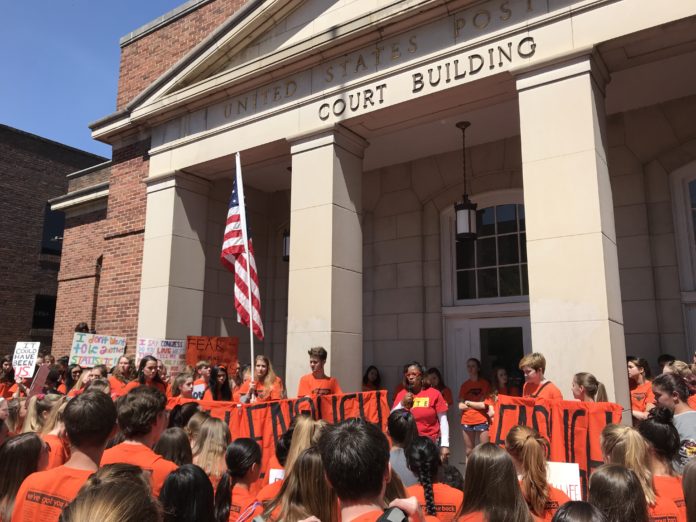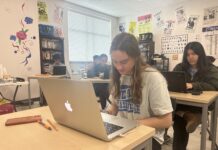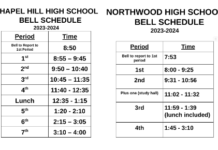
According to Chapel Hill High School’s student handbook, skipping class should result in either level II or level III consequences, which include anything from a parent conference to in-school suspension.
But if I walked out of class at any given moment, I could probably find at least a couple students in the courtyard avoiding the security guards, or hiding out in their cars or the library.
The truth of the matter is, lack of security and consequences make skipping easy. But on April 20, a day that marked 19 years since Columbine and this school year’s second national student walkout to protest gun violence, the Chapel Hill-Carrboro City Schools (CHCCS) district decided to enforce these scarcely used rules.
Warnings were vague, and rumors circulated that attending the protest at Peace and Justice Plaza at 179 East Franklin Street would result in a range of consequences, including a written referral or ISS. As of now, it’s unclear what, if any, consequences there will be for those who attended the protest. But the threats did their job. Many students decided not to attend the protest for fear of a report in their files that could even possibly take them out of the running to be valedictorian.
“I was very concerned about the repercussions of going to the protest because of all the threats we were given,” junior Erin Timmins said. “Ultimately, though, I ended up going because I knew whatever happened to me would be worth it if it meant my voice was heard.”
Students applying for National Honors Society (NHS) around the time of the protest were also concerned that a written referral would result in a rejection from the program. Fortunately, it seems that as of now, students who participated will still be admitted into NHS.
“Student voice is important, and however [protest participants] decided to express themselves would be taken into account,” NHS advisor Erica Kinney said. “One unexcused absence would likely not lead to a referral, but I can’t speak for every case.”
Kinney also stated advisors to the program would not necessarily be able to see the circumstances of a referral, only that a referral is present.
Athletes were told that, if they attended the protest, they would not be allowed to participate in games that afternoon or that weekend. Many members of the track and field team were discouraged from going to the protest because their conference meet was the next day.
“Protests have to have consequences to work, but it’s wrong to give one group of students more consequences for the same action, silencing their voice,” junior and member of the girls’ track and field team Lilly Crook said.
Through the protest, we as students were exercising our First Amendment rights to speech and assembly. The attempts to impede the protest and restrict our rights alone were enough to anger me and many other students. But the real proof that there was something wrong with the way the situation was handled is the fact that rules that are almost never enforced practically became law on just one day.
One confusing component of this event is the view of one CHCCS board member, James Barrett. On April 20, Barrett told Chapelboro that he thought the protests were “exciting.” While he did acknowledge that the administration had to “draw a line” somewhere, overall he seemed supportive of the student protest.
“I’m really glad [the students are] speaking out and making a change,” Barrett told Chapelboro.
If a member of the district’s board can see the true purpose of the protest, why can’t the administration respect our intentions? Does it not see the importance in honoring lives lost in school shootings from Columbine to Parkland, and onward?
Chapel Hill Principal Sulura Jackson had positive words to say about students who expressed opposition to gun violence, but did not mention the April 20 walkout explicitly.
“I support and respect students who are willing to speak out against school violence,” Jackson said. “I am appalled at the leaders in this country who refuse to take any proactive steps to prevent further shootings.”
While events were held at school to accommodate students who were unable to attend, the fundamental problem still remains: the CHCCS administration will not fundamentally support an act of protest that is completely student-regulated.











